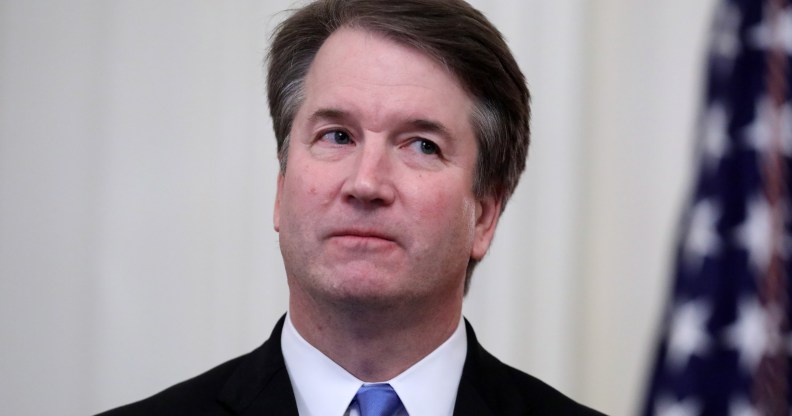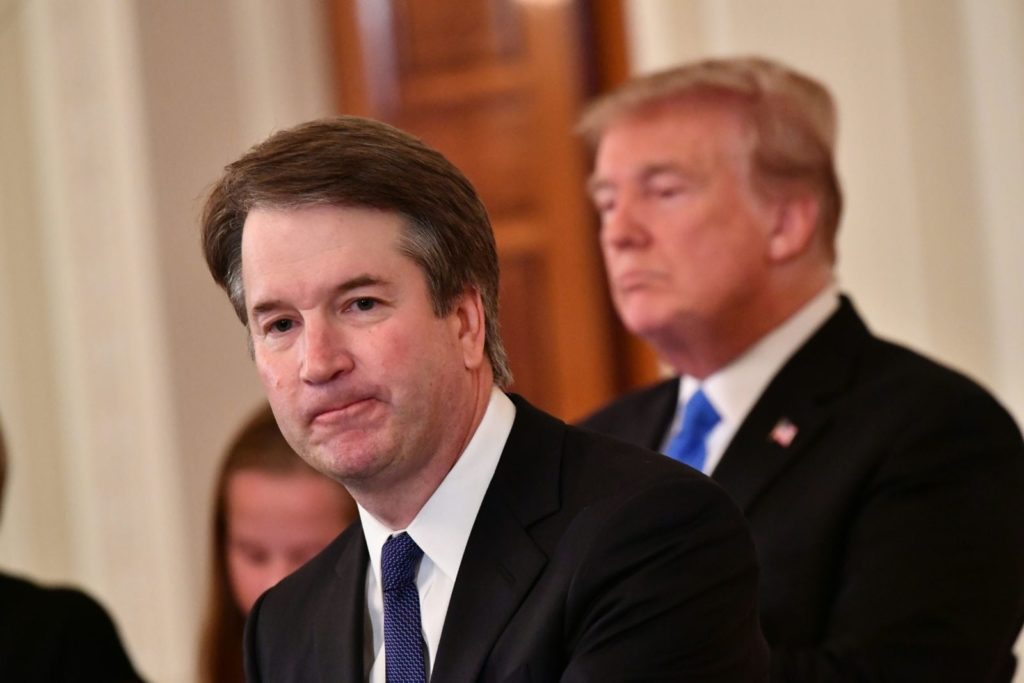Brett Kavanaugh will be at the centre of three landmark LGBT Supreme Court cases. This is where he stands on our rights

Brett Kavanaugh (Chip Somodevilla/Getty)
October 8 is the day the Supreme Court will hear arguments that represent the future of LGBT+ rights in America – and at the centre of it all will be Brett Kavanaugh.
Kavanaugh is among nine Supreme Court Justices who will be ruling on the three critical cases: Zarda v. Altitude Express, Bostock v. Clayton County and Harris Funeral Homes v. EEOC.
These cases will establish whether existing federal protections against sex-based discrimination cover discrimination against LGBT+ people as well.
Brett Kavanaugh hit the headlines back in July 2018 when three women accused him of sexual misconduct, which he denied.
His character was intensely scrutinised throughout the trial, but his views on LGBT+ rights remained firmly in the closet.

Supreme Court nominee Brett Kavanaugh with US President Donald Trump
What are Brett Kavanaugh’s views on LGBT+ rights?
Kavanaugh’s predecessor, justice Andrew Kennedy, was known for his ‘liberal streak’ and was a key figure in several LGBT+ rights cases. When Trump selected Kavanaugh for the Supreme Court, many LGBT+ advocates feared it would irrevocably tip the court’s balance against them.
Sarah Kate Ellis, CEO of GLAAD, said: “If confirmed, Brett Kavanaugh will have the chance to codify president Trump and vice president Pence’s dangerous anti-LGBTQ record and the agenda of anti-LGBTQ groups into law for decades to come.
“Like Neil Gorsuch before him, Kavanaugh is an ideologically-driven pick designed to create an activist Supreme Court that will undermine rights and protections for women, LGBTQ people, immigrants, and all vulnerable people. Americans do not want or need 40 more years of Trump’s values.”
Kavanaugh kept a low profile since his confirmation and has remained tight-lipped over his views on LGBT+ issues. Frustratingly, he has no judicial record on LGBT+ rights cases.
He was serving as a White House staff secretary in 2006 when then-president George Bush was seeking a constitutional amendment to ban same-sex marriage, but no documents have been released from this time.
However, during Kavanaugh’s confirmation hearing on September 6, the Supreme Court nominee refused to reveal his opinion on equal marriage.
This was condemned by Human Rights Campaign president Chad Griffin, who said: “Brett Kavanaugh’s refusal to answer very basic, very direct questions about the Supreme Court’s historic ruling bringing marriage equality nationwide is alarming and completely unacceptable.”
But perhaps the most telling sign that Kavanaugh could be a threat to LGBT+ people is the fact that his appointment was celebrated by several right-wing groups, including the Heritage Foundation and the Federalist Society.
The anti-gay National Organisation for Marriage – which has long advocated against LGBT+ equality – described Kavanaugh as “a constitutionalist who believes that the constitution means what it says and must be interpreted according to what the framers intended when it was crafted”.
They strongly approved his nomination, saying: “For the first time since marriage was illegitimately redefined by the US Supreme Court … we have a clear path forward to restoring marriage to our nation’s laws.”
Whether Kavanaugh’s views align with theirs will soon become clear as the Supreme Court prepares to hear three of the most pivotal LGBT+ cases in recent years.

